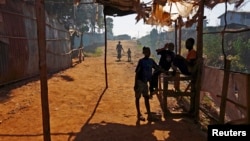A 2007 study estimated there were at least 250,000 children living and working in the streets of Kenya, with more than 60,000 of them in Nairobi. Adoption agencies have tried to reduce those numbers by matching orphaned or abandoned children with suitable families.
Misconceptions about adoption have been a hurdle, however, to finding homes for children in need.
Kate Irungu is the mother of two children, a 10-year-old boy and an eight-year-old girl. For her and her husband, the dream of having a family almost did not come true.
Through eight years of marriage they tried and failed to have children of their own, until they finally decided to adopt.
“I think adoption is good because if you cannot get a child, it gives you an opportunity to have one and it gives you the joy of being a parent. I think Kenyans should embrace adoption,” she said.
Adoption fears
But old fears concerning adoption have made it difficult for children needing homes and the groups trying to help them.
Susan Otwoma is the CEO of Little Angels Network, a children’s home launched in 2005 that helps facilitate more than 300 adoptions every year. She said in Kenya there still are a lot of misconceptions attached to adoption.
“One major one is that adoption is meant for infertile couples, those that are childless who cannot get their own children. It has taken a lot of education to just inform members of the public that even those with their own children can adopt," said Otwoma. "The other misconception is that adopted children are wayward, it is a belief, people just find it mysterious that you can adopt a child not born of yourself.”
Otwoma also dismissed concerns that adoption fees are prohibitive for Kenyan families. For domestic adoptions, the fees are about $400 [40,000 Kenya shillings].
“There has also been a misconception that adoption is very, very expensive here in Kenya and that it is only meant for the rich person, which is not true because the government has highly regulated the fees and they are highly subsidized,” she said.
Raising children
Irungu said adopted kids are no different from other children; they bring their own set of joys and challenges.
“It is easier to adopt a young child because you can tame his or her character, but I think it is hard when you adopt teenagers or older kids. But all in all adoption has its good side and bad side, just like raising kids in any household, whether they are yours or not,” she said.
Otwoma encourages families with children of their own to consider opening their hearts and homes to more children through adoption.
“Our guiding principle is that every child deserves to grow in a family," she said. "As much as the institutions will give the best care to the child, we believe that every child is best taken care of in a family setup.”
The Kenyan government has expressed concern about the plight of homeless children, especially the ones in the streets. But children's advocates have said existing programs are not a viable solution to a larger, societal problem that needs to be addressed.




